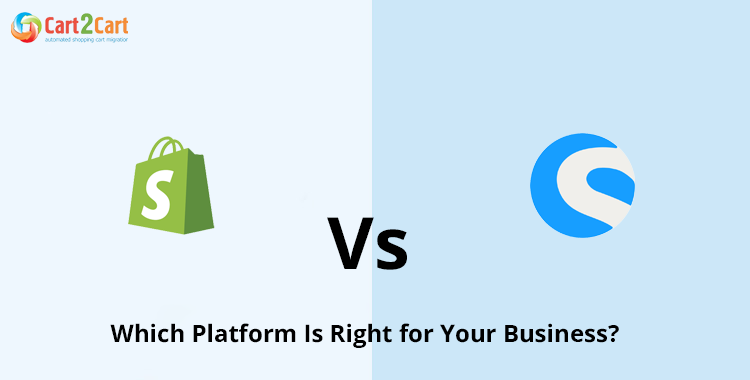 In the world of e-commerce, choosing the right platform to build your online store is crucial for your success. Two of the most popular platforms available today are Shopify and Shopware. Both offer powerful tools for building an online presence, but they have distinct differences that may make one more suited to your needs than the other. In this article, we’ll dive deep into a Shopify vs Shopware comparison, analyzing their features, pricing, customization options, and more, to help you decide which one is right for you.
In the world of e-commerce, choosing the right platform to build your online store is crucial for your success. Two of the most popular platforms available today are Shopify and Shopware. Both offer powerful tools for building an online presence, but they have distinct differences that may make one more suited to your needs than the other. In this article, we’ll dive deep into a Shopify vs Shopware comparison, analyzing their features, pricing, customization options, and more, to help you decide which one is right for you.
What is Shopify?
Shopify is a cloud-based e-commerce platform designed to simplify the process of creating and managing an online store. It is particularly known for its user-friendly interface, making it accessible to users with little to no technical expertise. Shopify provides a wide range of themes and apps to customize the look and functionality of your store, and it also offers excellent customer support.Key Features of Shopify
- Ease of Use: Shopify is known for its intuitive drag-and-drop interface, which makes setting up a store quick and easy.
- Payment Processing: Shopify integrates seamlessly with a variety of payment gateways, including its own Shopify Payments.
- Themes and Customization: There are numerous free and paid themes available, along with extensive customization options through coding.
- App Ecosystem: Shopify has a vast app marketplace, which allows you to add various functionalities like marketing tools, shipping integrations, and inventory management.
- SEO Tools: Shopify offers built-in SEO features to help your store rank higher on search engines.
What is Shopware?
Shopware, on the other hand, is a highly flexible, open-source e-commerce platform developed in Germany. It caters to businesses that require greater customization and control over their online store. While it may have a steeper learning curve than Shopify, it offers more freedom, especially for businesses with complex needs.Key Features of Shopware
- Customization: Shopware allows businesses to tailor every aspect of their store, from the design to the backend functionality.
- Open Source: Unlike Shopify, Shopware is open-source, meaning you have full access to the source code and can make extensive modifications.
- Multi-Store Functionality: Shopware offers built-in multi-store capabilities, making it easier to manage multiple online stores from a single admin panel.
- Advanced Product Management: Shopware allows for more advanced product management features, such as handling complex product variations and custom attributes.
- Strong Integration Options: Shopware offers a variety of integration options with third-party tools and services.

Shopify vs Shopware: Ease of Use
When it comes to ease of use, Shopify clearly has the advantage. Designed with non-technical users in mind, Shopify’s intuitive drag-and-drop interface allows even complete beginners to launch their online store with minimal effort. You don’t need to worry about web hosting or backend maintenance since Shopify handles everything for you. Shopware, on the other hand, is more developer-focused. While it provides a high degree of customization, it requires a solid understanding of web development and hosting. If you’re looking for a plug-and-play solution, Shopify is the better choice. However, if you need a platform that can be heavily tailored to your unique business needs, Shopware is worth considering.Shopify vs Shopware: Pricing
When comparing the pricing of Shopify vs Shopware, it’s important to consider the unique business needs and resources each platform offers. Shopify operates on a subscription-based model with several pricing tiers, starting from $39 per month for the basic plan to custom pricing for enterprise-level users. This pricing structure includes hosting, security, and access to a range of features, but transaction fees apply unless Shopify Payments is used. On the other hand, Shopware offers more flexibility with its open-source Community Edition, which is free to use, though it requires additional expenses for hosting, development, and third-party services. For more advanced features and support, Shopware’s paid plans start from €199 per month, offering more customization options and dedicated support. Ultimately, Shopify provides a more straightforward, all-inclusive pricing plan, while Shopware can be more cost-effective for businesses with the resources to manage hosting and development independently.Shopify Pricing
Shopify offers several pricing plans depending on the size of your business:| Plan | Price per Month | Key Features |
| Basic Shopify | $39 | Basic e-commerce features, limited reporting |
| Shopify | $105 | Advanced reporting, more staff accounts |
| Advanced Shopify | $399 | Advanced features, custom reports, third-party calculations |
| Shopify Plus | Custom Pricing | Enterprise-level features, custom solutions |
Shopware Pricing
Shopware offers both a free open-source version and paid enterprise versions. The free version provides the basic tools necessary to set up an online store, but for more advanced features and support, you’ll need to opt for a paid plan. Shopware’s paid versions come with a higher degree of flexibility and customer support.| Plan | Price per Month | Key Features |
| Community Edition | Free | Basic e-commerce features, open-source |
| Professional Edition | From €199/month | Additional features, support, and integrations |
| Enterprise Edition | Custom Pricing | Full customizability, dedicated support |
Shopify vs Shopware: Flexibility and Customization
Customization is where Shopware truly shines. Being an open-source platform, Shopware offers far more flexibility than Shopify. You can modify the backend, add custom features, and integrate any functionality you need. However, this level of customization requires a good understanding of coding and web development. Shopify, on the other hand, offers customization options through its theme editor and the ability to install apps. While this is sufficient for most users, it may feel restrictive if you want to make significant modifications to your store’s core functionality. However, Shopify’s app ecosystem can help you add almost any feature without needing to code.
Shopify vs Shopware: SEO and Marketing Tools
Both Shopify and Shopware offer strong SEO capabilities to help you rank higher in search engines.Shopify SEO Features
- Built-in tools for optimizing meta tags, URLs, and sitemaps
- Easy integration with Google Analytics and other SEO tools
- Ability to edit product pages and blog content for SEO optimization
Shopware SEO Features
- Advanced SEO tools for customizing every aspect of your site’s metadata
- Built-in schema markup for better search engine visibility
- Ability to install SEO plugins for more advanced functionality
Shopify vs Shopware: Customer Support
When it comes to customer support, Shopify offers 24/7 assistance via chat, email, and phone. They also have an extensive knowledge base, community forums, and a dedicated support team for enterprise-level users. Shopware’s support is primarily available for paid plans, but being an open-source platform, the community-driven support can be a bit hit or miss. It’s a great option if you have a development team, but if you’re a small business owner without technical expertise, Shopify might be a better fit.Shopify vs Shopware: Who Should Use Each Platform?
Both Shopify and Shopware are great choices for building an online store, but they cater to different types of businesses.Shopify is ideal for:
- Small to medium-sized businesses with limited technical expertise
- Entrepreneurs looking for an easy-to-use, all-in-one e-commerce solution
- Businesses that require fast setup and 24/7 customer support
Shopware is ideal for:
- Businesses with complex needs that require custom functionality
- Companies that have an in-house development team
- Enterprises looking for a highly flexible, open-source solution


